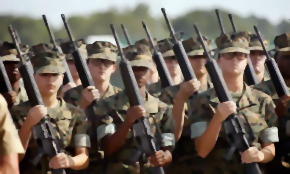The National
Rifle Association (NRA) has been taken over by the firearms industry and is
promoting radical views to increase sales. Hunters, hobbyists, and decent citizens are
being fed propaganda from secret agendas of greed.
I want to
exercise my second amendment rights. I
can no longer support the NRA. We
citizens have the right to own and responsibly use firearms. It is enshrined in the constitution. The
firearms industry has used the NRA to twist our rights into something
sinister.
Do not be
fooled. Not everyone against the immoral
practices of firearm manufactures is trying to take your guns away. Do not let your fear overwhelm your good
sense. Do not let the intentional
polarization of the debate allow greed and fraud run amok in our land.
Way Back When
When I was
very young we were not wealthy. Dad
supplemented our meager chicken coop meat supply with deer, duck, trout, and
salmon.
 |
| Generational bonding on the hunt |
Grandpa shared
his “The American Rifleman”, the NRA’s magazine, with me. I read about adventure
cuddled in a cozy army surplus sleeping bag.
Lusting after my own .22, begging for my own BB gun, watching dad load
his own ammo or simply watching my grandpa clean his vintage M1 rifle were
apart of my childhood.
Starting
in 1977, as a soldier, I learned how to use many kinds of firearms
proficiently. Safe handling of pistols,
assault rifles, and mortars became my profession.
Throughout
its history, the NRA had been a bipartisan group of liberals and conservatives
that shared common interests in guns, hunting, and marksmanship.
The NRA
was a rifle club. It worked with the
National Guard to improve member’s marksmanship. Hunter education, marksman competitions, and
hobby promotion were its main focus.
This hobby sporting group even advocated conserving natural habitat for
game. National training programs taught Boy
Scouts how to handle guns safely.
Radical Revolution
While I
was learning the weapons of war, the NRA became radicalized. Fevered, angry Second Amendment
fundamentalists using walkie-talkies, bull horns, and orange baseball caps
staged a highly organized coup to take over leadership of the NRA.
The
organization went from a club for sportsmen, to a radical political lobby.
 |
| Dissent shouted down |
The cause
of the revolution was the Gun Control Act of
1968. Incited by turmoil of the
1960s where multiple assassinations, street violence and riots drove Congress to
regulate the interstate commerce of firearms.
The Act made
it illegal for convicted criminals, addicts, the mentally ill or non-citizens
to purchase guns. Many conservatives, including Ronald Reagan and Richard Nixon, publicly supported the act.
The NRA’s
new leader after the coup was Harlon Carter.
Mr. Carter had been convicted
of murdering a 14 year old Hispanic boy in Texas
Carter
proclaimed violent felons, the mentally deranged, and addicts had a right to
gun ownership because it was “a price we
pay for freedom”. He even advocated giving grade school
children pistols for self defense from bullies.
Fear Mongering for Money
Using
fear and terror tactics, the new NRA leaders declared that the government was
trying to take away all the guns from everyone.
 |
| Harlan Carter |
Any limitation
on firearms was declared traitorous.
Everyone, at any time, and in any place should be able to have a
firearm. Adults, children, criminals and
insane all should be free of any restrictions. Church, school, funerals, and athletic events should allow the bearing of arms.
As professionals
who work in advertising should know, fear
sells. Fear sells better than sex or
greed.
Regular
bulletins were mailed to members, each escalating the trepidation that guns
were about to disappear. Article after
article, press release after press released followed. Constantly repeating the threat to freedom
and the imminent demise of the second amendment, terror was put into the hearts
of men.
Scaring
people by saying things that were not true gave good people doubt. Hearing lies told over and over again, many
began to believe the deceit was truth. A
closed mutual support network of alarm amplified the messages even further.
Fear
worked.
In only a
few years, membership in the NRA had tripled.
The new members brought their cash with them.
Selling
branded apparel, bumper stickers and decals at high markup, the money rolled in.
More money was raised by selling, cancer, theft, and medical insurance. Like carnival hucksters, they dazzled members
with overpriced trinkets and misdirection.
Radical Lobbying
Another
of the revolutionary leaders, Neal Knox, moved to Washington DC
 |
| Neal Knox |
The
money, lobbying, and campaign contributions paid off when Congress passed the Firearm Owners Protection
Act of 1986. The new law stopped government
from tracking gun ownership and allowed ammo to be sent through the mail and
across state lines unregulated. The law stripped
the ability for the government to know when a criminal, addict, or insane
person had been sold a gun.
Some lawmakers said off
the record that they would have voted against the act but feared
retaliation from the NRA’s now powerful gun lobby come election time.
Corporate Money
Money
from gun manufactures significantly impacts the funding of NRA’s lobbying
effort. Private gifts from owners of
manufactures and from gun industry firms have been estimated at over $70
million per year.
 |
| Not very wise |
Without firearm
industry’s donations, the NRA would not be able to maintain its membership
programs, much less lobby government.
“The NRA is basically helping to make sure
the gun industry can increase sales," Representative Carolyn McCarthy "No one is challenging NRA members' right to
own guns."
Midway
USA, Sturm, Ruger & Co. Smith & Wesson, and Beretta USA
The $16
billion a year firearm industry uses the NRA as its spokesman. The NRA no longer represents gun owners and
hobbyists.
The NRA “translates
the industry's needs into less crass, less economically interested language --
into defending the home, into defending the country," said
Tom Diaz of the Violence Policy Center.
 |
| No firearms here please |
"The NRA clearly benefits from the gun
industry," William Vizzard, a former agent with the Bureau of Alcohol,
Tobacco, Firearms and Explosives. "There’s
a symbiotic relationship. They have co-aligned goals much more than 30 or 40
years ago."
They
"started out as a grassroots
organization and became an industry organization," Vizzard also
said, "The NRA is generating
fear. The industry has learned that the
more controversy there is about guns, the more guns sell -- whether it’s a
legitimate controversy over a bill, or a trumped-up one like, 'Obama’s been
re-elected, they’re going to take away our guns.'"
In his
book, Ricochet: Confessions of a Gun Lobbyist, former NRA lobbyist Richard
Feldman said that the NRA had degenerated into "a cynical, mercenary political cult," that was "obsessed with wielding power while
relentlessly squeezing contributions from its members."
Partisan Politics
With the
new lobbying effort, the NRA came to be closely tied to the Republican Party. What had once been a non-partisan hobby
organization now was directly involved in one-sided election politics.
 |
| Responsible training is good |
Activists
began to claim that black helicopter carrying federal agents dressed like
ninjas were coming to take the guns away.
Using the tragedies at Ruby Ridge , Idaho and Waco ,
Texas
This was
too much for even staunch conservatives like Ronald Reagan who wrote about the
assassination attempt on his person “Lives
were changed forever, and all by a Saturday-night special - a cheaply made .22
caliber pistol - purchased in a Dallas pawnshop by a young man with a history
of mental disturbance. This nightmare might never have happened if legislation
that is before Congress (the Brady Bill)...
had been law."
George
H.W. Bush, who resigned his NRA membership over this radical rhetoric, wrote "I was outraged when, even in the wake of the
Oklahoma City
Changing Tactics, Not Direction
A stunned
ex-president of the NRA observed “We were
akin to the Boy Scouts of America
 |
| Guns and Moses |
To change
their growing negative public image, they decided to bring in an action movie
star, Charlton Heston. Heston put a new
spin on the same rhetoric. Predicting
the loss of liberty,
Heston recast the NRA message in patriotic terms. Using images of Pearl Harbor, Concord , Lexington
Actively
working for the Republican campaign, Heston helped sway sufficient voters in
the swing states of Arkansas and West Virginia
In the
most recent election of 2012, the NRA lobbying group directly spent $20 million
on federal campaigns alone. With new
Super PACs it is no longer possible to know how much was spent indirectly. The NRA spends significantly more on issue
specific advertising and soft money political action committees which effect
elections results.
Fourteen
out of the 29 lobbyists employed by the NRA previously held government
jobs. 90% of those were Republican
appointees, prior to working for the NRA.
Gun Sales Explode
According
to the General Social Survey,
the NRA’s partisan lobbying has radically changed gun ownership in the United States
 |
| Households with guns by political party |
Using
Charlton Heston as a spokesman, gun sales exploded.
 |
| Number of background checks per year. |
By
spreading the fear that a Democratic President would take their guns away, the
industries sales accelerated the trend even further.
Obama supports the Second Amendment and he's
unabashed about saying so. Those who say
he is lying are trying to manipulate us.
 |
| Number of firearms manufactured by year |
The NRA
is more interested in fighting than winning second amendment rights. Fighting increases gun sales. Winning would make us safer.
Find a Better Way
No
civilized person should support or approve of the misuse, the criminal use nor
deranged use of lethal weapons of any kind.
We need
to agree on a return to public civility on this issue. We must be considerate of each other and
address our violence issues as concerned, rational adults.
We must
find a way to allow responsible citizens to keep and bear arms, while
protecting ourselves from criminals, accident, and the mentally ill.
Perhaps
arming teachers with Tasers is a better solution than handguns. Perhaps better ways to identify criminals and
the insane can be found. Perhaps legal
and medical professionals can help us find better ways to reduce violence.
I will
not pretend to have the answers to solve this complex problem. There are no simple solutions to violence.
However,
I will not support the NRA until it returns to its sporting, hobbyist
roots. I will not support the NRA until
it stops being a prophet for firearm manufactures profits.




























